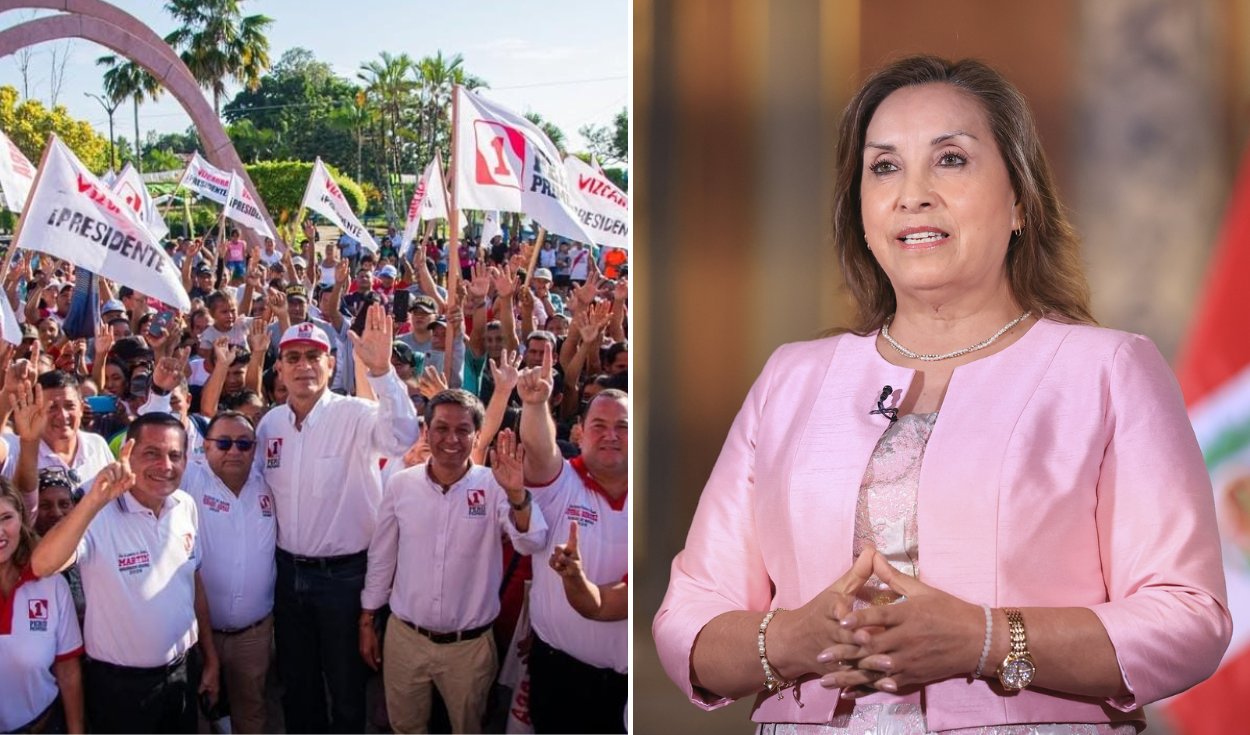Just one year before the general elections, sympathies and dislikes are beginning to deepen within the national political scene. Martin Vizcarradespite his disqualification from holding public office for 10 years, does not lose hope of being part of the electoral contest and continues to tour the country as a pre-candidate for the presidency with his Peru First political party.
On his recent visit to Loreto, Vizcarra was applauded by the population who received him with enthusiasm. According to videos captured by the former president’s communication team, the Loreto population accompanied the former president with harangues: “Vizcarra, friend, the people are with you.”
YOU CAN SEE: Peruvians protest against Dina Boluarte in Switzerland two days after her arrival for the World Economic Forum
However, the situation is different for current president Dina Boluarte which has only 3% approval. Although the president will not participate in the 2026 General Electionbecause re-election is not possible under the current Peruvian constitutional order, a marked contrast is evident between the support he currently has Martin Vizcarra and the complaints that Boluarte faces when he goes to the interior of the country or during official activities in Lima.
Boluarte’s poor connection and sympathy with the population was evident during his last visit in 2024 to the Chosica district. On that occasion, the population of Chosica rejected the president’s presence with cheers, among which stood out: “For all those who have died because of our incapable and incompetent president. Instead of fixing her nose, let her fix our country.” “said one of the protesters against Boluarte.
However, it is not only Boluarte that is the object of rejection by the population towards the political class. Different parliamentary representatives of parties that will participate in the next General Elections of 2026 have also been accused by citizens for various reasons. Such is the case of the representatives of Peru Libre, who were rejected last year in Huancayo for having voted in line with Fujimorism in several projects presented. “Get out, get out! Nobody wants you,” the protesters were heard saying in a market attended by congressmen from the group led by the fugitive Vladimir Cerrón.
Almost a year before the next electoral elections, the population is beginning to show its preferences for some political figures and its rejection of certain national representatives.
YOU CAN SEE: Cardinal Carlos Castillo on the play María Maricón: “No one here has wanted to destroy the image of the virgin”
Despite the rejection, Boluarte is ironic with her low approval
Despite the specific disapproval of the head of state, Dina Boluarte does not seem worried about it. On more than one occasion, the president has ironically commented on the low approval rating recorded in the polls. Recently, he asked pollsters to assign him a 0% approval rating so “he can continue working without worries.”
“This year that ended, 2024, we saw with satisfaction and pride that our economy has grown. No one can deny that, not even those who say that we do nothing and who rate us with 3% or 4% in the surveys. Yesterday , a newspaper that loves us very much raised us one more point: 5%. I tell them not to do me a favor. I haven’t asked them to give me a 0, and then we will be calm and without worries,” he said. the president with irony.
It is not the first time he has had a similar speech. At an event in Carabayllo on December 21, 2024, he commented on the first report that indicated that only 3% of the population approves of his management. In this context, he expressed: “To those who rate me with a 3% approval rating, I say: better give me a 00, then we are tied and we are going to penalties. Why do you spend your money and energy on this? At first they gave me a 11%; then they even came with proposals to raise two points in exchange for something, but I answered no.”
Just days before, on December 20, at an official event in Chalhuanca, Apurimac, Boluarte maintained his sarcastic tone by referring again to his low approval rating. To the audience, he said: “In Lima they say I have 3% approval. And what do we respond? Here we are. I just smile and say: ‘Lord, forgive them, because they don’t know what they say or what they survey.'”
Martín Vizcarra: approved by the population, but with pending trials
Despite the popular approval that the former president Martín Vizcarranot everything is positive for the leader of Peru First. The former governor of Moquegua also faces legal proceedings against him for the alleged crime of passive bribery, in the context of the Moquegua hospital case. According to the fiscal theory, during his term as regional governor of Moquegua, the former president would have requested and received a bribe of S/1.3 million in exchange for awarding the work to the construction company ICCGSA.
YOU CAN SEE: Former Minister Marisol Perez Tello announces her candidacy for the presidency with the Primero La Gente party
Along the same lines, José Fernando Castillo Dibós, former general manager and former president of the board of directors of ICCGSA, declared that he gave 60 thousand dollars to the former president during a meeting with him and the former Minister of Agriculture, José Hernández. Castillo Dibós, who presented himself as an effective collaborator, was interrogated by prosecutor Osías Germán Castañeda, and admitted knowing the engineer Hernández, identified as an intermediary in the bribes received by Vizcarra. In addition, he recalled that ICCGSA participated in the tender for the Moquegua hospital called by UNOPS, where the regional government of Moquegua, chaired by Vizcarra, had the final decision on the award of the work.
In addition to this, Vizcarra faces constitutional accusations within the Congress of the Republic. In the context of a complaint for the alleged crimes of incompatible negotiation and illegal appointment to the detriment of the State, he is accused along with the former Minister of Justice, Ana Revilla, of having irregularly appointed Daniel Soria Luján as attorney general. In the last session of the Subcommittee on Constitutional Accusations (SAC) of Congress, the former president decided to remain silent and only intervened to express his disagreement with the accusation and with the treatment received by the congressmen linked to his constitutional accusation process.















